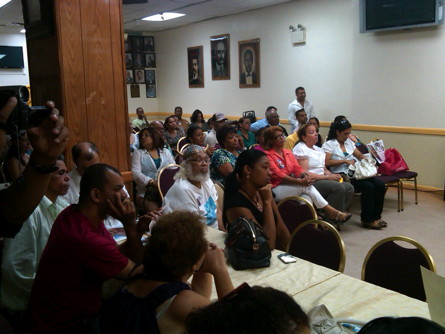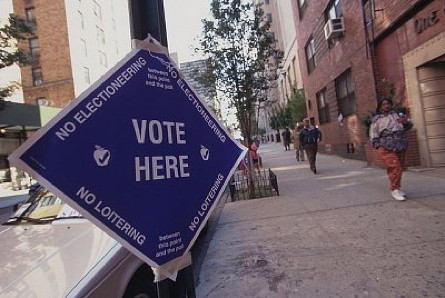Family Values at Play in State Senate Race in the Bronx

Photo by David Howard King
ALBANY, N.Y. — Maybe it was state Sen. Gustavo Rivera’s vote for same-sex marriage. Perhaps it was that Rivera backed state Sen. Adriano Espaillat’s run against U.S. Rep. Charles Rangel. It could also be that Rivera unseated Ruben Diaz Sr.’s fellow amigo, convicted state Sen. Pedro Espada, in the 2010 race.
Whatever the impetus, Diaz has been giving Rivera’s little-known challenger for the 33rd State Senate District, Manny Tavarez, the support of his formidable ground operation in the run up to Thursday's primary. That operation includes a slew of vans and trucks equipped with loudspeakers that blast slogans and campaign workers that move through the Bronx handing out stacks of literature.
Diaz Sr., also may have given Taverez financial support as well, but it is impossible to know because, as of press time, Tavarez hadn’t filed any campaign finance documents with the state Board of Elections.
"It's not surprising that he has endorsed my opponent, given that he worked closely with my corrupt predecessor,” Rivera said of Diaz’ support for Tavarez.
Rivera does have the support of another Diaz: His son. Bronx Borough President Ruben Diaz Jr., is seen as more progressive than his father, and has endorsed Rivera and made public appearances with him; the two have also worked together on a health initiative. Rivera told the Gazette earlier this year that the borough president was his “hero” when it came to fitness and health.
Yet the same political machine that includes the fleet of vans and dozens of campaign workers that have worked in the past to get Diaz Jr., elected are now supporting Tavarez — and, in the Bronx, that alone might make the difference in the challenger’s effort to unseat Rivera.
Neither Diaz Sr., nor his son responded to emails and phone calls requesting comment for this story over the past week. Tavarez also didn’t respond to requests for comment.
Diaz, father and son, have kept a distance from each other in the public eye.
Diaz Sr., is seen as an old-school machine politician who blurs the lines between his status as a reverend and as an elected official.
That army of vans that Diaz has are housed at his church the Christian Community Neighborhood Church and, during election season, Diaz hosts block parties across the Bronx that are sponsored by his church. The parties gather groups of citizens that are then targeted by Diaz’s get-out-the-vote team. The Christian Community Benevolent Association, which owns the church, has been a major beneficiary of Diaz’s status as a senator.
In fiscal year 2006-2007, Diaz was able to steer nearly $500,000 in member items to the CCBA. In May of this year, the financial officer for the CCBA was accused by prosecutors of embezzling $75,000.
Diaz also hasn’t exactly been a team player when it comes to being a Senate Democrat. In 2008, Diaz joined with Sens. Pedro Espada, Carl Krueger and Hiram Monserrate to hold the senate majority hostage for more power. It wasn’t clear if Democrats would have a majority heading into session that year. Later, when Monserrate and Espada joined Senate Republicans and created the Senate coup, Diaz remained a Democrat but also stayed very friendly with the defectors.
Since then, Diaz has watched as Monserrate, Espada and then Krueger were either drummed out of the Senate or convicted on federal corruption charges. Rivera was able to defeat Espada in the 2010 Democratic primary before Espada was convicted. Diaz told The New York Times that he felt then-Attorney General Andrew Cuomo overreached in his charges against Espada and that it was part of a “vendetta” for the coup.
Diaz gnashed his teeth and stomped his feet while the Senate passed same-sex marriage in 2011, cursing fellow party members who voted for the bill and telling the Republicans they should be ashamed of themselves for even allowing such a vote.
His son, on the other hand, has projected an image of a new school Democrat and a team player. He has very publicly disagreed with his father’s belief that there should be no separation between church and state and his sometimes vicious attacks on homosexuals.
“We have an agreement,” Diaz Jr. told NY1 in 2009. “He doesn't tell me how to be borough president, I don't tell him how to vote in Albany.”
The gay community has been critical of Diaz Jr., for not speaking up loudly against the vitriol his father has spit at the community.
Ken Padilla, a Bronx district leader who went from working with the Diaz’s to waging a public battle with them, says that he has never seen much separation between father in son when it comes to political decision-making.
“For the two years I spent working with them, the two made major decisions in the same room,” he said. “The father would never do anything without consulting the son. He would never do anything to hurt his son’s political career.”
Padilla filed an IRS complaint against Diaz for storing his campaign vans at his not-for-profit church.
So while Junior may be publically supporting Rivera, Padilla says he thinks what really matters is Senior’s endorsement of Tavarez — which comes along with an entire political organization.
“Junior may be going along with the party line and supporting Rivera, but it is the organization, the structure, the people, the vans that matter and the father controls that,” Padilla said. “Senior’s support comes along with the vans and the people. It’s the same people, the same vans for junior and senior.”
BOE spokesman John Conklin said that Friends of Manny Tavarez was formed on April 19, 2012, and has not filed any financial statements with the board since then.
The committee should have filed a July periodic statement and a 32-day pre-primary statement.
Conklin says the board has sent multiple letters to the campaign asking that it show cause for failing to file and has begun the process of suing the committee.
Born in Rochester in 1979 to Dominican parents, but raised in the Bronx, Tavarez previously worked for District Leader Hector Ramirez’ unsuccessful campaign in 2010 for the 86th State Assembly seat (Nelson Castro, one of Rivera’s supporters, won that race), according to his website. The website also says Tavarez had experience during City Councilman Fernando Cabrera’s campaign in 2009. Before local politics, he was involved in baseball academies in the Dominican Republic.
On his website, under a section entitled “family values,” a message reads: “Manny Tavarez is pro-life. He believes that life begins at conception and wishes that the laws of our state reflected that view. Taking innocent life is always wrong and always tragic, wherever it happens.”
Rivera, on the other hand, is a member of the Bipartisan Pro Choice Legislative Caucus of the state Senate.
Second-Longest Running Show Now on Broadway is Uptown

Photo of voters in Washington Heights/Andy Humm
NEW YORK — The second-longest running show now on Broadway is not in the Theatre District, but uptown in Washington Heights.
In this sliver of a neighborhood on Manhattan’s upper Upper West Side, Broadway is the high street in the Dominican American community — and there hasn’t been a curtain call in over two decades on the rivalry between Guillermo Linares and Adriano Espaillat since both ran for City Council in 1991.
Linares won to become among the first Dominicans elected to public office in the U.S.
El Diario/La Prensa columnist Roberto Perez calls this rivalry “the Washington Heights version of the Hatfields and the McCoys.” He also wrote that their late August debate at the Hamilton Heights Social Club Los Bravos “felt more like a cockfight arena than a forum.”
On Thursday, Sept. 13, the two men square off against each other in yet another Democratic primary — this time for the state Senate seat that Espaillat holds.
Linares gave up a run for his Assembly seat to seek the Senate seat that Espaillat was giving up to challenge incumbent Charles B. Rangel in the newly-drawn and newly Latino-majority 15th U.S. Congressional District.
Rangel, with Linares’ support, won that race by a hair — just 990 votes — in a rare June primary that was rattled by questions over the balloting. Following his loss, Espaillat decided to try to keep his Senate seat in the separate September primary. (Full disclosure: I did some work last spring writing campaign literature for the Rangel campaign.)
The new 31st State Senate District hugs the east bank of the Hudson like Chile does the Pacific, covering Inwood to Hell’s Kitchen (with a few blocks of Chelsea thrown in) — but its heart is still Dominican Washington Heights.
It had been Eric Schneiderman’s district until he ran successfully for state Attorney General in 2010 when Espaillat won a three-way primary for it.

Espaillat has the distinction of being the first Dominican American elected to the State Assembly in 1996, knocking off longtime incumbent Brain Murtaugh in a primary.
He also fended off a strong challenge from Miguel Martinez, a former ally, in 2008. (Martinez served in the City Council from 2002-09, when he resigned amidst a conspiracy scandal in which he was ultimately convicted.)
Linares served in the Council from his historic election in 1991 until he was term-limited out in the 2001 election. He was appointed by Mayor Bloomberg as Commissioner of Immigrant Affairs in 2004, where he served until taking the Assembly seat that Espaillat gave up to run for the state Senate.
Bloomberg pledged to back Linares’ current campaign by raising $100,000 for him.
Espaillat and Linares debated on Manhattan Neighborhood Network on September 4. In the debate sponsored by the League of Women Voters, they tended to agree on most issues, while attacking each other over their commitment to stronger rent laws and the failure of the state to adopt nonpartisan redistricting this year.
Espaillat said, “I believe very strongly this primary [by Linares] is being bankrolled by the landlord interests. My opponent has received $40,000 from the landlord lobby to push me out.” Linares did not dispute the donation.
On tenant issues, Linares said that as a City Council Member in 1997 he “was one of the few who stood up to the Speaker to prevent vacancy decontrol,” which was approved in the Assembly with Espaillat’s vote and virtually every other pro-tenant member as part of the renewal of the rent laws that the Republican Senate would allow only in that weakened form.
Espaillat takes credit for getting the rent laws renewed in 2012. “For the first time, we were able to pass slight improvements,” he said.
Linares told Gotham Gazette that, as landlords try to renew their J-51 tax break this year, he will insist on “strengthening of the rent laws and eliminating vacancy decontrol” as part of the bargain.
Nevertheless, Tenants PAC, which endorses candidates based on their commitment to tenants’ rights, is going with Espaillat in this race, calling him “a major player in the fight for stronger rent laws and the preservation of affordable rental housing.”

At the cable TV debate, Linares cited his endorsements from Councilman Robert Jackson, State Senator Tom Duane, former Manhattan Borough President Ruth Messinger, former Councilwoman Ronnie Eldridge and former Public Advocate Betsy Gotbaum.
Espaillat cited support from Congressman Jerry Nadler, Assemblyman Dick Gottfried, Assemblywoman Linda Rosenthal, Citizens Union (the sister organization of Gotham Gazette) and Tenants PAC.
Linares has District Council 37 of American Federation of State, County and Municipal Employees; Espaillat has the United Federation of Teachers, 32BJ SEIU, the Working Families Party, and the Hotel Trades Council.
The split between the opposing political camps is long and deep.
Moises Perez, a longtime community leader and the former director of the now shuttered Allianza Dominicana social services center in the district who managed Rangel’s re-election bid, said it doesn’t stem from a dispute over the issues. “It’s about political ego,” he said.
The men have competing political clubs — Linares’ Concerned Democratic Coalition of Northern Manhattan and Espaillat’s Northern Manhattan Democrats for Change.
There was a brief peace between the two in 2010 when Espaillat ran for Senate and Linares for Assembly without running opponents against each other.
“The community would rather see us working together,” Espaillat said. “[Linares] wants to run against me for Senate. Wants to impose his daughter for the seat he left behind. This is not a blueblood district — the royal kingdom where titles are passed by sons and daughters. There are plenty of people with leadership qualities in the community.”
Both men are tenacious, though Linares is more low-key and seemed to be waiting his turn to run in 1991 and saw Espaillat as jumping the gun by challenging the longtime incumbent Stanley Michels in 1989.
“When we faced off in 1991 [for City Council], I had been serving this neighborhood for 15 years,” Linares said. “I have been an activist since I landed here as a teacher.”
Espaillat countered: “He is a go-along kind of politician.” Linares said: “In order to represent all groups and constituents, I had to earn their respect.”
He also added that he stuck with Rangel over his fellow Dominican because the longtime congressman “is an ally of our community” who he has worked with for years.
Both men took Ed Koch’s pledge not to vote for a redistricting plan for state legislative districts unless it was independent and nonpartisan.
When Senate Republicans reneged on their promise to Koch to take politics out of the process and Gov. Andrew Cuomo decided not to put up a fight over it, Espaillat was among those who walked out of the chamber during the vote on the partisan lines that added a 63rd State Senate District designed to help the Republicans hold the slim majority they regained in 2010.
Espaillat attacked Linares for voting for the redistricting plan — as most Assembly Democrats did. Linares countered that he is “fully supportive of an independent commission” to draw the lines and attacked Espaillat for voting for the partisan lines 10 years ago as an Assembly member.
Linares said his priority as Senator will be passage of the New York DREAM Act to “allow undocumented students who meet in-state tuition requirements in New York to access state financial aid for higher education,” according to the bill’s website.
It passed in the Assembly but was “dead on arrival” in the Senate, Linares said, a status that is unlikely to change unless Democrats can re-take the chamber.
While the Senate race is the main event, the undercard Assembly contest is almost a proxy fight for the two men. One candidate is blessed by Espaillat — Gabriela Rosa, a member of Community Board 12 and a senior policy advisor to Assemblyman Denny Farrell; while another is backed by Linares — his daughter Mayra Linares, a community activist, district leader and recent aide to Cuomo.
The voters could instead opt to go an independent route by electing either Melanie Hidalgo, a member of Community Board 12, or perennial candidate and community activist and career Air Force veteran Ruben Dario Vargas.
A debate among the four Assembly candidates at the Centro Cultural Deportivo Dominicano on Amsterdam and 163rd Street, founded in 1966, drew more than 200 people for a high noon Spanish-language showdown on a beautiful Saturday in the middle of Labor Day weekend. It began with the playing of the national anthem.
Three of the candidates — Linares, Rosa and Vargas — squared off in an MNN cable debate as well. While most spoke in generalities about the issues, on mayoral control of the schools, Linares came out in favor of “more involvement of parents.” Vargas was in favor and Rosa was opposed to the system of governance that began under Mayor Bloomberg.
Rosa said she would be “independent and a team player.” Vargas said: “We have to stop people being selected by political machines because their hands are tied.” And Linares replied, “It is important to have relationships and know how to work with others.”
Trying to stick it to Linares, Rosa said: “Mine is a community candidacy, not inherited.” Linares said she has been involved in the community since she was “5 years old handing out fliers.”
Mayra Linares told the Gotham Gazette that she was “born and raised in this community” and has lived in three of its neighborhoods — Washington Heights, Marble Hill and now Inwood. She was attacked by her opponents for taking landlord money; but, like her father, she promises to support tenants “100 percent.” Tenants PAC is backing Rosa.
No poll has been released in the two races, but some prognosticators gave Espaillat the edge in the contest over the Senate seat because he has just come off a high-profile tussle over Rangel’s spot in Congress. Mayra Linares is seen as the favorite in the Assembly race simply because of her name.
Whatever the outcome, the battles of Washington Heights show no signs of letting up any time soon. In a city where incumbents are rarely subjected to serious challenges, the voters uptown almost always get lively, competitive races.
UPDATE: An earlier version of this story said that Espaillat vowed during his Congressional race that he would not try to keep his Senate seat if he lost. Ibrahim Khan, a spokesman for Espaillat, said the candidate never made that claim.
_____
Andy Humm is the co-host of the weekly Gay USA cable TV show, a contributor to Gay City News, and a former city Human Rights commissioner.
5 Primary Races Worth Caring About

Not alluring enough to grab the attention of most voters, primary elections are often ignored by all but the most politically engaged.
But with financial scandals, rivalries and allegations of bribery in the background this year, the state’s legislative primaries, being held on Sept. 13, are definitely worth paying attention to.
We’ve picked the top five worth caring about — as much for their drama as for their political gravitas.
The Rivalry: 31st State Senate District
Sen. Adriano Espaillat wasn’t planning on running for his old state Senate seat, but his challenge to U.S. Rep. Charles Rangel didn’t go the way he wanted.
Now Espaillat faces his longtime political rival Assemblyman Guillermo Linares in a race for the 31st State Senate District. The history between the men dates back to the early 1990s, when Linares defeated Espaillat for a seat on the City Council. It’s likely that election reform will be on Espaillat’s mind should he be reelected; a number of irregularities took place at the Board of Election during his challenge to Rangel.
Both Linares and Espaillat take pride in their Dominican roots and have been active on workers’ rights. Espaillat enjoys the support of a number of Linares' Assembly colleagues and most of the Senate Democratic conference. Not every state Senate Democrat has lined up to back Espaillat — retiring Sen. Tom Duane served on the Council with Linares and has endorsed him. Meanwhile, Mayor Michael Bloomberg has gotten involved in fundraising for Linares.
The Missed Opportunity? 55th State Assembly District
William Boyland should be in the fight of his life for his 55th Dstrict Assembly seat.
The assemblyman beat bribery charges only to be quickly indicted again on federal bribery charges after prosecutors say he solicited cash from an undercover FBI agent. Boyland also managed to go a full year without sponsoring any legislation and has one of the highest absentee rates of any legislator. Boyland is the poster boy for machine politics and Albany dysfunction.
However, Boyland faces eight challengers in the primary. It’s unlikely all of them have mounted full campaigns, and having that many names on the ballot will likely split the vote.
The Boy-Toy Scandal: 80th State Assembly District
The Democratic incumbent in the 80th State Assembly District is Naomi Rivera, the daughter of a storied Bronx political family. Her main challenger is real estate agent Mark Gjonaj, a favored son of the borough’s Albanian community, as well as a commissioner of the Taxi & Limousine Commission.
What was supposed to be a lukewarm contest became a whole lot more interesting in recent weeks after a certain New York tabloid began detailing allegations of how Rivera had hired an ex-boyfriend to run her taxpayer-funded nonprofit.
More allegations of nepotism followed, which were then followed by reports that the state ethics commission was investigating Rivera’s actions and that the city’s Department of Investigation was also looking into her hiring practices. Rivera has denied the allegations, but the storyline has stuck.
In Office, In Handcuffs: 10th State Senate District
In conversations earlier this year, a number of those involved in the Senate Democrats' efforts to reclaim the senate majority made it clear that they expected a few “new faces” in the conference.
Although not made explicit by them, the fact that they accepted the idea that a number of their sitting colleagues would be defeated in the primary very easily could have come from concerns lingering over a number of their candidates.
The 16th State Senate District was very likely on their list of districts.
Reports about investigations into Huntley’s nonprofit popped up periodically for months until a few weeks ago, when Huntley held a weekend press conference to announce that she expected to be arrested. Huntley has been charged with aiding a conspiracy to defraud the state and forging documents sought in an investigation.
Huntley’s campaign seemed to already be in trouble as they announced a number of endorsements they had not actually won. Meanwhile, Councilman James Sanders is a strongly financed candidate. The state redistricting process actually made a good section of Sanders’ council district — where he is well known — a part of Huntley’s newly drawn district.
New District, New Legislator? 16th State Senate District
Sen. Toby Anne Stavisky has spent 13 years in the Senate representing Queens — and, if it's up to John Messer Stavisky, she won’t be there for one more year.
The pair are running for a new seat redrawn under the redistricting process to ensure strong representation for Asians. Stavisky’s family had controlled Stavisky’s old seat for decades but she would have had to primary against Sen. Tony Avella to keep it, thanks to redistricting.
The new district is made up of 53 percent Asians and does not include the Bay Terrace Area — a section of Queens that has traditionally been Stavisky’s stronghold. Messer has touted his connection to the Asian community and accused Stavisky of ignoring the concerns of the Asian population in Queens. Messer has also donated hundreds of thousands of dollars of his own cash to his campaign.
Stavisky, however, has the backing of the establishment, including Sens. Chuck Schumer and Kirsten GIllibrand, as well as the majority of the city’s Asian politicians. Messer ran against Stavisky in 2010 and finished third.




